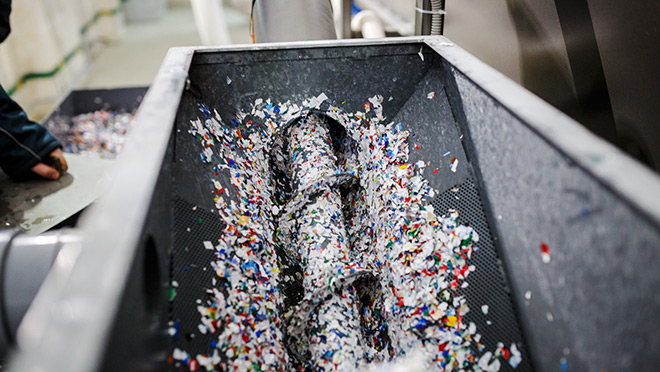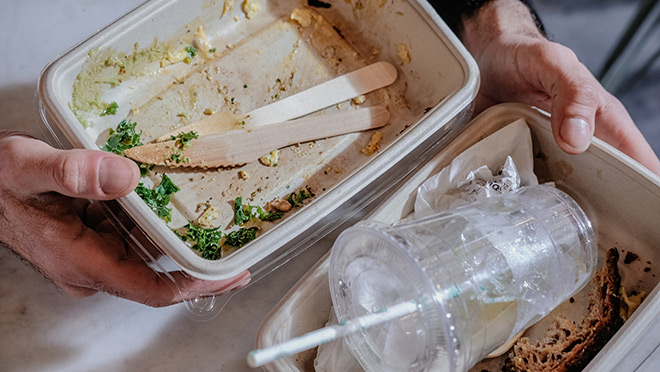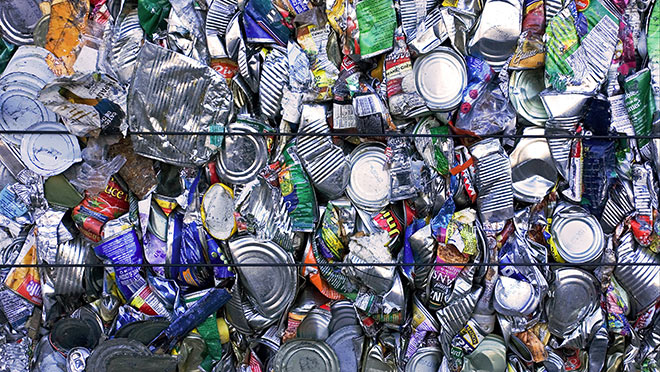How you can help recyclers do their job

Know your takeout containers and the official materials list
There's a home somewhere outside the landfill for everything from pizza boxes to batteries and plastic wrapping. The more we pay attention to sorting those items, the better B.C.'s recycling system will work.
Despite rumours to the contrary, B.C.’s residential packaging and paper recyclable items aren't just collected locally and shipped off to foreign countries. About 97% of plastics collected by Recycle BC, for example, are processed into tiny pellets and re-used to create new plastic products.
"We collect over 200,000 tonnes of material each year, and 90% of what we collect is managed by recycling," says Lyndsey Chauhan, marketing communications director for Recycle BC. "We want residents to be familiar with the material list, which is important for a couple reasons."
The biggest reason, says Chauhan, is that Recycle BC wants to find a way to collect as many residential packaging and paper recyclable items as possible. And without knowing the full materials list, many people are unaware that even plastic bags, foam and plastic overwrap, are recyclable. You just need to collect it and drop it off at a depot instead of putting it in your recycling pick-up bins.
"If people don’t help us collect those items in the first place, we can't recycle them," she says.
The other big reason for getting up to speed on the materials list is to reduce contamination. That's where the "right item, right place" mantra hits home, as batteries tossed in with paper can result in fires, and oily food containers can spoil perfectly recyclable items around them.
With Chauhan as our guide, here are a few things to pay attention to as you sort and recycle as much as you can.
Check the materials list online
Get to know Recycle BC's materials list for details about the majority of household packaging and paper items, and ElectroRecycle's accepted products list for electronics. Also check The Recycling Council of B.C.'s Recyclopedia, which includes the most complete list in B.C.
Did you know that London Drugs locations also accept a long list of items that include paper, plastic bags and overwrap, batteries and electronics, light bulbs, and medications?
Sort and/or clean items to reduce contamination
"The less contamination there is, the more material we can recycle," says Chauhan. "We ask that for items that have some residue, or a bit of food product on them, that residents rinse them off a little."
That doesn't mean using litres of hot water to thoroughly rinse out an olive oil container. But it does mean not tossing that container into the bin with an ounce or two of oil still in it, or "recycling" a pizza box with pieces of crust or melted cheese still in the box or egg shells in the egg carton.
And then there are the plastics. Check to see that a plastic item has a recyclable symbol on it – that broken salad spinner, for instance, may not be recyclable at all – and then see if a recyclable (check the number) lines up with the acceptable items list.
There's also a list of items you can't put in your recycling bin but that can be dropped off at a recycling depot, including some plastic items that don't have a recyclable symbol. Those items include white and coloured foam packaging (Styrofoam, etc.), plastic shopping bags, plastic overwrap from paper towel and other packages, and even those crinkly potato chip bags.

One takeout food container is not like the other
With the rise of food takeout during the COViD-19 pandemic, there's been an explosion of single-use packaging, ranging from paper, to plastics to compostable paper takeout containers. What you do with those items depends on whether they're recyclable or compostable in your area, and they should be rinsed to remove food residue.
Recycle BC has an excellent blog post on takeout packaging that includes a plea to keep white foam containers clear of the recycling bin, as they can crumble easily and contaminate the recyclable containers they're tossed in with. That foam is recyclable, but you'll need to collect it for a trip to a recycling depot.
Plastic packaging labeled compostable, biodegradable, oxodegradable, or photodegradable is not accepted in your recycling bin. And not all items labelled "compostable" are compostable in your town or city. You can check with your local government to learn what is and is not accepted in organics bins.
Keep hazardous items out of the bin
Batteries are recyclable, but need to be taken to a depot. When compressed in a collection truck or at a recycling facility, they can cause fires. Keep a bag handy to collect used batteries, then drop them off in the appropriate bin at a local recycling depot.
It's equally important to keep lighters, butane or propane canisters, flammable liquids, ammunition, paint, knives and electronics out of recycling bins Read the warning labels you find on these products and take care to dispose of them properly. Learn more about hazardous materials and how to dispose of them properly. Use this hazardous items search tool to find out where you can take such materials.
If it runs on electricity, it's probably recyclable
Most items that run on electricity, including battery-operated toys and other items, are recyclable. It's a good idea to keep a clearly marked bin or bag in your home to collect such items (keep a separate bag for batteries) you can drop off later at a local depot.
The list of recyclable electronics is long and includes power tools, blenders, treadmills, audio equipment, medical equipment, cell phones and residential office appliances such as photocopiers. You can find a list or search for electronics items at returnit.ca or at electrorecycle.ca.
Who pays for recycling?
While provincial and local governments promote recycling in a big way, they don't fund Recycle BC’s residential packaging and paper recycling program. Recycle BC is a not-for-profit organization that gets its funding from businesses that supply residential household packaging and paper to B.C. residents.
"It's not like the recycling deposit, with the consumers actually paying a fee specifically for each item," says Chauhan. "We work directly with the producers. The program is funded by the businesses and the producers, and that's somewhat unique as a producer responsibility program."
That program also allows Recycle BC to have a consistent acceptable materials list across the province, so that consumers don't have to be re-educated should they move within the province. "It helps to avoid confusion," says Chauhan.
Related:
- What should I do with delivery packaging? (Recycle BC)
- How to recycle common takeout packaging (Recycle BC)
